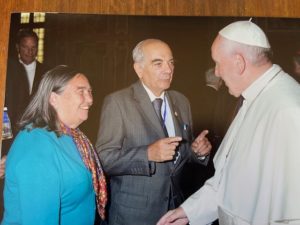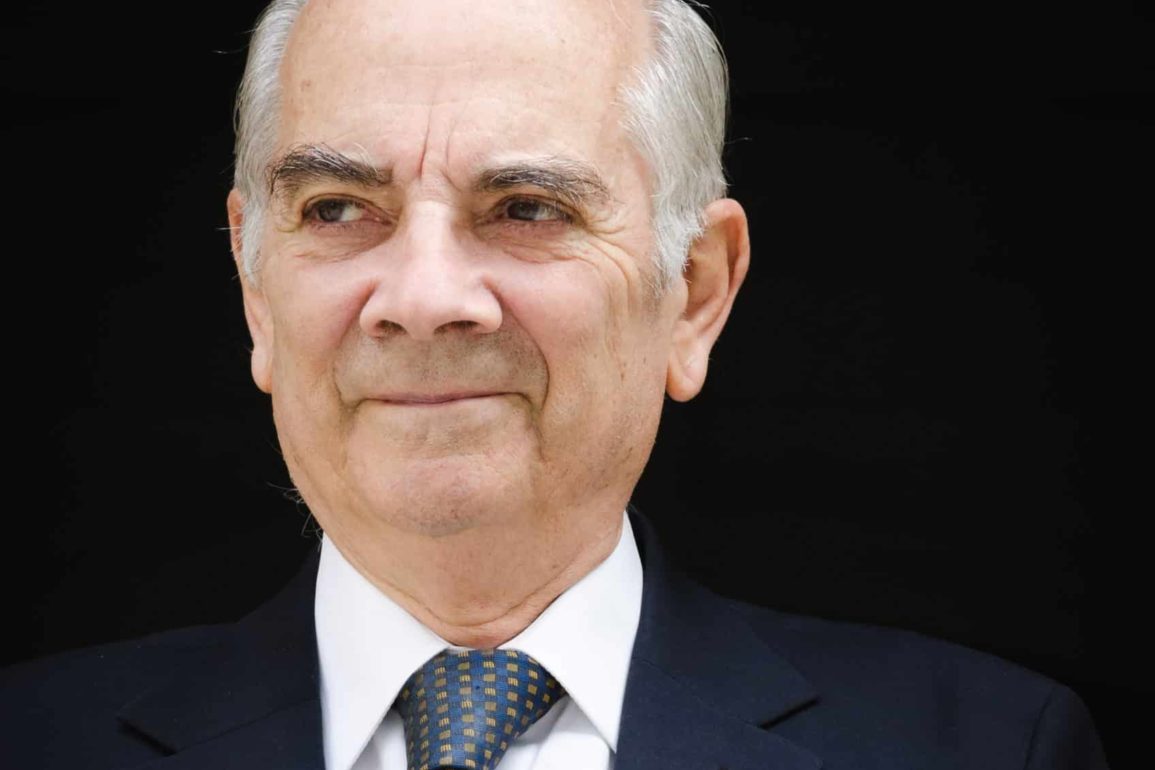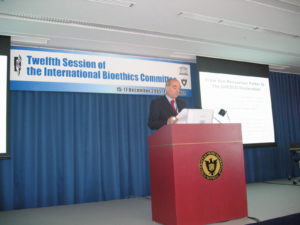The University “Ateneo Pontificio Regina Apostolorum” -UPRA- conferred its award “Una Vita per la Vita” 2022, to Dr. Patricio Ventura-Juncá. This distinction is based on the long academic and humanitarian trajectory of the scientist in favor of life.
The event took place on November 4. In his master class before the in-person and virtual auditorium, Professor Ventura-Juncá reviewed the most relevant milestones of his professional career, also making a connection with his personal life.
He led the formation of the first neonatal intensive care center in Chile
Between 1969 and 2000 his university and clinical activity was developed in the Faculty of Medicine of the Pontifical Catholic University of Chile -PUC-, in the field of Neonatology and Pediatrics. This was a period of great fruitfulness in the development of clinical care, teaching, and research. Dr. Ventura-Juncá led the formation of the first neonatal intensive care center in Chile, at the Clinical Hospital of the PUC, and later the Pediatrics service at the University Hospital. As a result of these advances, the survival of newborns improved by 50% in this center, a result that merited its publication in the Pediatrics Magazine in the United States, so that this pioneering experience was known and recognized in the scientific world.
International recognition
Ventura-Juncá brought together a plethora of physicians and researchers of outstanding academic and human competence. His successor in the direction of the Department of Pediatrics is today the rector of the PUC and his successor is today dean of the Faculty of Medicine of the university. A true school in neonatology and pediatrics was formed, as evidenced by numerous scientific publications, book chapters, and books on the specialty, and his leadership was recognized in Chile, Latin America, the United States and several European countries. At first, in 1975, pediatrics in the clinical hospital was limited to one ward. Today it is a modern service and department with all types of specialties. This was his first stage of commitment and dedication to the life of children, who could survive with a long life ahead of them.

On the verge of retirement, he was appointed director of the Bioethics Center of the PUC
In the year 2000, at the age of 63, soon to retire, considering his background of a solid formation in Philosophy (1961-63), he was appointed director of the Bioethics Center of the PUC. This was a providential and unexpected change in which Dr. Ventura-Juncá was able to pour his managerial and academic experience in a field in which debates were strongly emerging, especially concerning the beginning of life and the inalienable right to life of human beings, especially in the early stages of their existence. The Bioethics Center created the first Master of Bioethics, made progress in undergraduate and graduate teaching, in research and in public debate and participation in laws concerning nascent life. This development led Pope John Paul II to appoint Dr. Ventura-Juncá as an ordinary member of the Pontifical Academy for Life -PAV- and later, in 2005, as a member of its Board of Directors.
There he worked with people notable for their competence and dedication and especially supported the nomination of members with proven scientific and/or philosophical competence who recognized the gift of life from its beginning until natural death as an inviolable right. He also managed the invitation to PAV congresses of scientists involved in cutting-edge research in various fields, especially those related to the beginning of life. At the age of 79, already at the age limit for membership, he left the PAV.
Science, clinic and philosophy
Dr. Ventura-Juncá’s competence in science, clinical practice, and philosophy, made it easier for academics who already knew him by his trajectory, as someone who had lived next to the sick and the youngest children, to appreciate and validate his arguments in bioethics, making him a frequent guest at seminars and international congresses in Latin America and Europe. All this facilitated a respectful and rigorous dialogue with those who held different approaches to respect for nascent life. This is how he received several awards, in addition to those already received in his career in pediatrics, this time in bioethics, as a visiting professor in various countries, such as Cuba, Argentina and Italy, for his academic career. In 2008 he received the Bioethics Award from the Chilean Medical Association.
At the age of 75 he retired from the Catholic University of Chile and was appointed director of the Bioethics Institute of the Finis Terrae University. It was a stage of maturity in which he taught bioethics and philosophy of medicine, developed numerous activities, including several seminars and international postgraduate congresses, and advanced his line of research on integral ecology and bioethics.
Encounter between philosophy and biology: bioethics
The need to relate bioethics with ecology was a recurring theme in Professor Ventura-Juncá’s vision for 15 years, influenced by the initial intuition of Van Rensselaer Potter on the need for the encounter of philosophy with biology, from which bioethics arises. According to Potter, the survival of the entire ecosystem depends on this interaction. Dr. Ventura-Juncá’s vision was also influenced by John Paul II, when he speaks of human ecology and the family. Finally, Pope Francis’ texts, Laudato Si and Frattelli Tutti, which develop an integral ecology, also influenced Dr. Ventura-Juncá’s vision. Professor Ventura-Juncá mentions as a backdrop to his presentation the phrase attributed to Leonardo da Vinci: “Learn to see. Realize that everything is connected to everything else.”
Everything is connected
To Pope Francis’ phrase in Laudato Si: “Today the analysis of environmental problems is inseparable from the analysis of human, family, work, urban contexts, and of each person’s relationship with himself, which generates a certain way of relating to others and to the environment” (LS 141). This line of research has expanded the topic of interrelationships to the field of the beginning of life in which the stage of the human being’s life from fertilization to embryo implantation is extraordinarily vulnerable to changes in the environment, as occurs in in vitro fertilization affecting the epigenetic profile and development. Today there are innumerable scientific articles dedicated to pointing out this problem, mainly in animal studies, given the ethical difficulties of doing so in humans. This was testified in a landmark article by Ventura-Juncá published in a high impact scientific journal and cited numerous times: Ventura-Juncá, P, et al. “In vitro fertilization (IVF) in mammals: epigenetic and developmental alterations. Scientific and bioethical implications for IVF in humans.” Biological Research 48 (2015): 1-13.
His inspiration
Dr. Ventura-Juncá’s academic career has been inspired by his service to the Church, especially of evangelical values in the scientific university and teaching field, as well as in various Church instances. He belongs to the Schoenstatt Movement, which has been the fundamental inspiration for his spirituality, community life and apostolate, being very relevant to his encounter with the founder, Father Joseph Kentenich in 1964 in Milwaukee. He has stood out with his wife Marita as leader of various Schoenstatt communities and especially for accompanying the formation of various groups of young couples.
Member of the Academic Committee of the Latin American Academy of Catholic Leaders
For 5 years, he has been a member of the Academic Committee of the Latin American Academy of Catholic Leaders, where he has contributed in the elaboration of topics of his competencies in the formative itinerary, participating in various current pastoral and pedagogical activities, witnessing the dynamic development of the academy, in which thousands of young people interested in projecting the Social Doctrine of the Church in public life are formed.
Ventura-Juncá has also cooperated with the Episcopal Conference of Chile and has made a contribution to the Aparecida Meeting on bioethical issues related to the beginning of life.
Continues his professional contribution
He is married to María Carmen Domínguez Covarrubias, with whom he has three children and ten grandchildren. The life, support and affection of his family has been key in all his academic, professional and pastoral endeavors.
Currently he continues to support the teaching of medical ethics and bioethics at the Finis Terrae University, also participating in the Research Ethics Committee of this academic center.
This is how the service to life in Prof. Ventura-Juncá’s career has had a clear direction, first in the development of neonatology and pediatrics and then in the ethics of life. Quoting Anna Arendt, he closed his presentation at the “Una Vita per la Vita” award ceremony by pointing out that “with each new birth, hope is renewed in the world, with new men and women who are capable of starting and making better the things that burden our world today. This faith and hope find their most glorious expression in the proclamation of the Gospel: ‘unto us a Child is born'”.
The recording of the award ceremony can be accessed through the following link:











